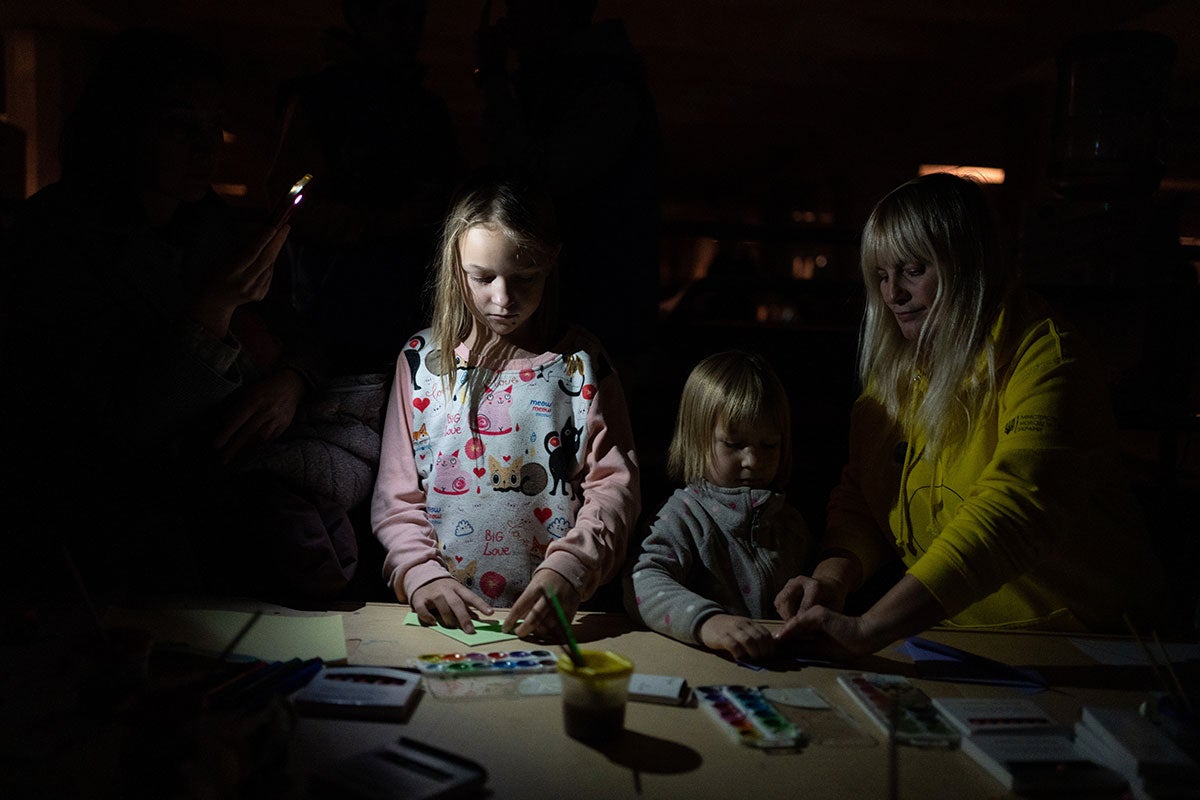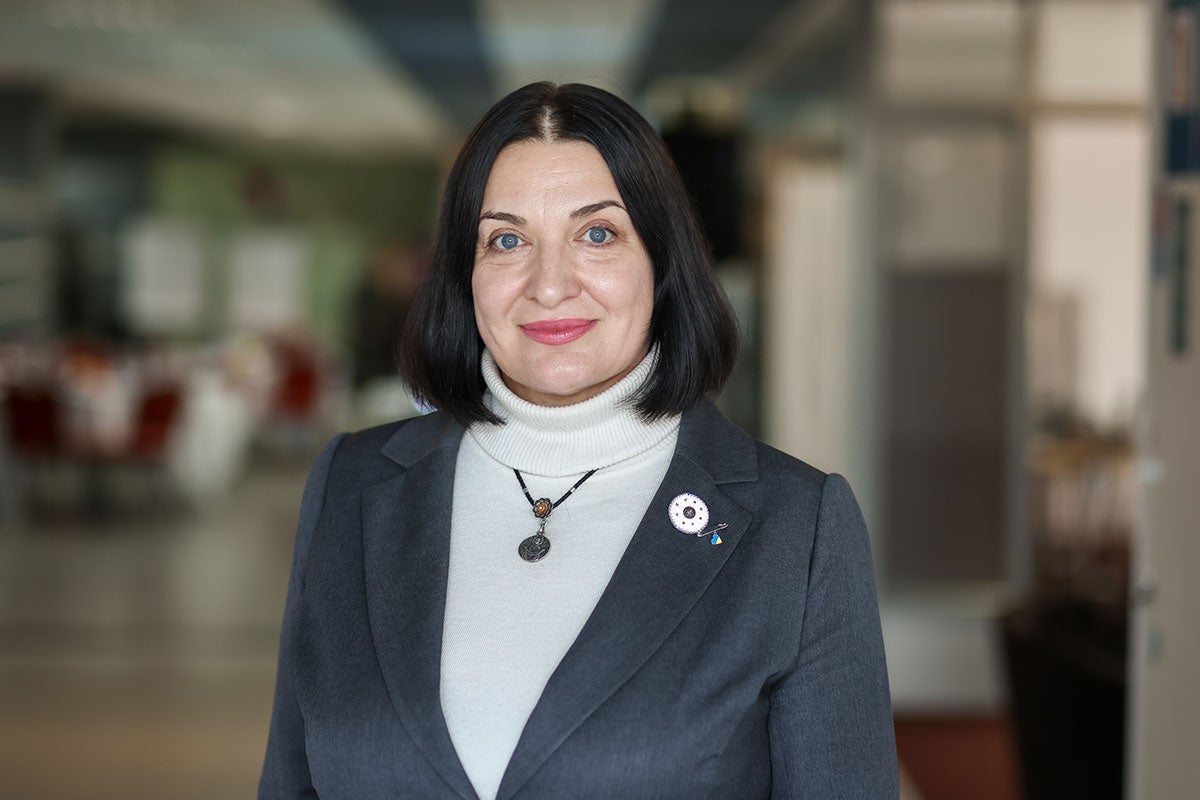Women in Ukraine persevere amid blackouts after attacks on power infrastructure
Date:

Children play amid electricity cuts, air raids, and attacks on the city of Kharkiv, Ukraine, on 15 November 2022. Photo: UNICEF/UN0747379/Filippov
“For my business, winter with blackouts is a disastrous time,” said Iryna Fishchuk.
Fishchuk runs a small bakery and café in Ivano-Frankivsk, a city in western Ukraine, where she employs women who have been displaced by Russia’s full-scale invasion. But ongoing attacks on the country’s energy infrastructure have made it increasingly challenging for Fishchuk to keep her business operational and her employees paid.
“Blackouts also create moral pressure,” she said, describing how her generators are not capable of running the bakery’s ovens during extended power outages—and how she therefore has difficulty paying her staff, who rely on their work for their basic living needs.
“Every winter is a matter of survival for the business and the employees you hire,” said Fishchuk, who also heads the Road of Taste of Prykarpattia, a network of local restaurants and food producers.
Since the full-scale war began in 2022, Russian forces have repeatedly attacked Ukrainian power plants and other energy infrastructure.

Iryna Fishchuk, Head of Road of Taste of Prykarpattia. Photo: UN Women/Valentyna Naumenko
President Volodymyr Zelenskyy said on 29 November 2024 that there had been at least 1,120 attacks on the country’s energy infrastructure since 2022. This year, nine waves of attacks in just more than five months—from 22 March to 31 August 2024—damaged or destroyed power generation, transmission, and distribution facilities, according to a report by the UN Human Rights Office.
The attacks on power infrastructure impact all Ukrainians, especially as the winter arrives—when cold weather and shorter daylight hours mean that demand for electricity increases by 20 to 25 per cent. These attacks have specific consequences for women and girls.
“Power outages affect the ability of women to work and support their families,” said Liliia Kislitsyna, President of SMARTA, a women’s rights group based in the Donetsk Region, on the frontlines of the war.
Kislitsyna, who also works as a coordinator for Coalition1325, a network of organizations in Donetsk seeking to protect women in the war, also noted that many displaced women work for small businesses that are forced to close or restrict their working hours due to blackouts.

Liliia Kislitsyna, President of SMARTA and Coalition1325 coordinator. Photo: UN Women/Valentyna Naumenko
“The further one goes into remote towns and villages, the worse the electricity situation becomes,” she said. “As a result, women often work fewer hours and do not receive full wages.”
Even when businesses have generators, the costs of running them can be prohibitive, as noted by Sofia Burtak, president of the Rural Women Business Network, an organization that provides aid to women farmers and women-owned agricultural businesses. Since Russia’s invasion of Ukraine in 2014, the network has also supported internally displaced women and helped women-owned businesses develop strategies for dealing with power cuts.
“Blackouts significantly increase production costs,” she said. “The cost of one kilowatt of energy produced by a generator is 20 Ukrainian hryvnia higher than the cost of one kilowatt from the central grid. Even with an alternative power source, the impact on costs, pricing, and production is substantial.”

Sofia Burtak, President of the Rural Women Business Network. Photo: UN Women/Valentyna Naumenko
In a 2024 survey of 800 women-owned rural businesses, Burtak said that the Rural Women Business Network found only 35 per cent of respondents said they had backup power sources capable of maintaining their operations.
“As a result, the risk of power loss translates into an income loss for the entire family,” she said.
UN Women works closely with women's rights organizations in Ukraine, including SMARTA and the Rural Women Business Network. With the support of the United Nations Women's Peace and Humanitarian Fund, UN Women has been able to provide over USD 20 million in grants to 54 women-led organizations since the start of the large-scale invasion by the Russian Federation in February 2022, such as institutional grants to organizations in need, including for items such as generators.
The power cuts are also felt by women who work within the home. Electricity cuts have a major impact on food preparation and storage, and women—who already shoulder disproportionate care burdens—are forced to spend more time on domestic tasks and are therefore less likely to participate in the labour force.
A lack of electricity “affects basic needs, such as cooking food and going in and out of the apartment, especially when you live on the upper floors of a high-rise building. Having to climb up and down several times a day is a real challenge,” said Nataliia Chermoshentseva, a gender expert and activist who coordinates volunteer efforts with the Dignity organization, which works to help communities formerly occupied by Russian forces.

Nataliia Chermoshentseva, gender equality consultant. Photo: UN Women/Valentyna Naumenko
She described how many tasks disproportionately done by women—such as cooking, purchasing supplies and groceries, and cleaning—are dependent on electricity. Schools operate fully remote due to the war in many places around the country, and children cannot attend classes without power and internet.
“Ukraine ranks among the top countries in digitalization, and we have many electronic services, including those related to social welfare, work, and education,” Chermoshentseva said. “Many of our survival strategies — such as receiving alarm notifications through mobile apps, deciding when to move to shelters, monitoring the situation, etcetera — depend directly on internet access.”
“When we talk about the various impacts of the war, there is a specific gender group— women—who are affected much more,” Chermoshentseva said. “Power outages are not a gender-neutral problem.”